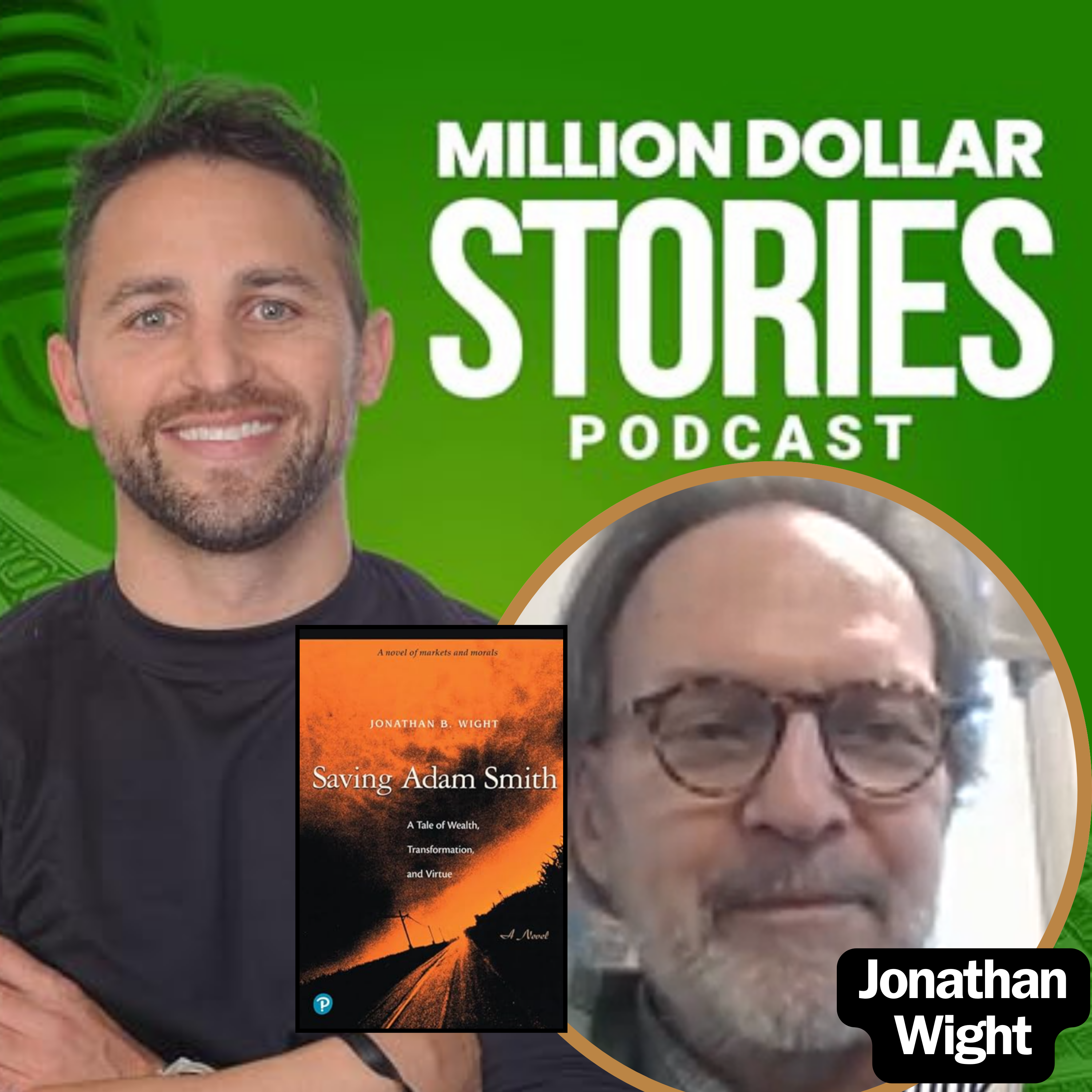Virtue in Entrepreneurship: Jonathan B. Wight Unveils the Hero’s Journey in ‘Saving Adam Smith
Mike interviews Jonathan Wight.
In a captivating episode that dives deep into wealth, transformation, and virtue, Jonathan B. Wight engages in an enlightening conversation, exploring the core concepts presented in his book, “Saving Adam Smith: A Tale of Wealth, Transformation, and Virtue.” This insightful dialogue unfolds, unravelling the profound wisdom in Wight’s work and shedding light on the intersection of economics, entrepreneurship, and morality.
SUMMARY
An increasing surge in entrepreneurial activity among young individuals worldwide. Drawing parallels to the apprehensions arising from the consolidation of power in major industries, Wight concurs that this entrepreneurial spirit responds to the fear of corporate dominance. Young individuals are venturing into creating multiple revenue streams, navigating the realms of advertising, podcasting, and brand building. Wight identifies this surge as a global movement, emphasizing the growing momentum of an entrepreneurial spirit.
Wight explores the evolving landscape of entrepreneurship. Wight emphasizes the ease of starting a business in various domains, citing a push for deregulation in specific industries. The discussion touches upon the importance of interventions, particularly in areas like education, echoing the sentiments of Adam Smith, who advocated for government involvement in providing education for the less privileged. Wight’s stance reflects a moderate perspective, recognizing the merits of markets while acknowledging the need for judicious regulation.
Delving deeper into ethical considerations, Wight navigates the terrain of virtue ethics—a philosophy emphasizing moral character and the development of virtuous traits. He shares insights on Adam Smith’s “Theory of Moral Sentiments,” highlighting the importance of feeling what others feel and judging the appropriateness of those emotions in a given context. This leads to a profound discussion on the hero’s journey, where entrepreneurship is likened to an individual embarking on a journey through chaos and uncertainty, ultimately reaping the rewards of their efforts.
Wight shares a personal story that underscores the transformative power of empathy and selflessness in business. Reflecting on his experiences, he emphasizes the significance of focusing on others rather than oneself. This narrative aligns with Adam Smith’s views on empathy, challenging the misconception that empathy equates to pity. Wight underscores the importance of judging whether emotional responses align with the circumstances, making a case for empathy rooted in understanding and not mere sympathy.
The conversation is intriguing as the exploration of Adam Smith’s religious inclinations unfolds. Wight acknowledges Smith’s surface alignment with Christianity among the founding fathers but delves into the complexities of Smith’s views on God and the role of divine forces in the natural order. The discussion becomes a tapestry of philosophy, ethics, and the intricate interplay between religious beliefs and economic principles.
In a thought-provoking exchange, the duo touches upon the concept of a spiritual war—the eternal struggle between good and evil. Wight reflects on the duality of human nature and the capacity for goodness and darkness within each individual. This leads to a contemplation of hell as a state of disassociation from God rather than a posthumous destination.
The conversation wraps up with a poignant reflection on sin as “missing the mark.” Drawing on Jordan Peterson’s insights, Wight explores that the consequences of sins lie not in a punitive afterlife but in the inherent punishment of missing the mark—of losing purpose and enduring a soulful solitude.
Jonathan B. Wight embarks on a captivating journey through the intersections of entrepreneurship, ethics, and the human experience. Wight’s book, “Saving Adam Smith,” emerges as a beacon of wisdom, guiding listeners through wealth, transformation, and virtue complexities. As the episode concludes, one ponders the profound insights shared—a testament to the enduring relevance of Adam Smith’s teachings in the ever-evolving landscape of business and morality.
Get his book here:
About Mike Fallat
Mike Fallat, aka The BookMan, is the owner of Dreamstarters Publishing and the Million Dollar Book Agency. They have helped 300+ entrepreneurs become bestselling authors. His goal is to help 1,000 entrepreneurs publish books and teach them how to use their books as a gateway to generating 7-figures.
Visit website for more information: https://www.milliondollarbookagency.com/

About Dreamstarters Publishing
Dreamstarters Publishing offers ghostwriting, cover design, and everything that is required to take an idea to a finished book (kindle, paperback, hardcover, and audiobook).
The Million Dollar Book Agency is the ultimate marketing CRM system for author-preneurs. Services include automated funnels, lead generation campaigns, book fulfillment, podcast management, press releases, virtual assistants, course development, and more.
Mike also hosts a podcast known as Million Dollar Stories and runs a membership-based site known as Million Dollar Circle. In addition to owning the book business, he invests in self storage real estate.
https://dreamstarterspublishing.com/

